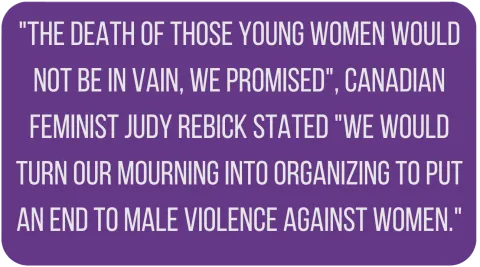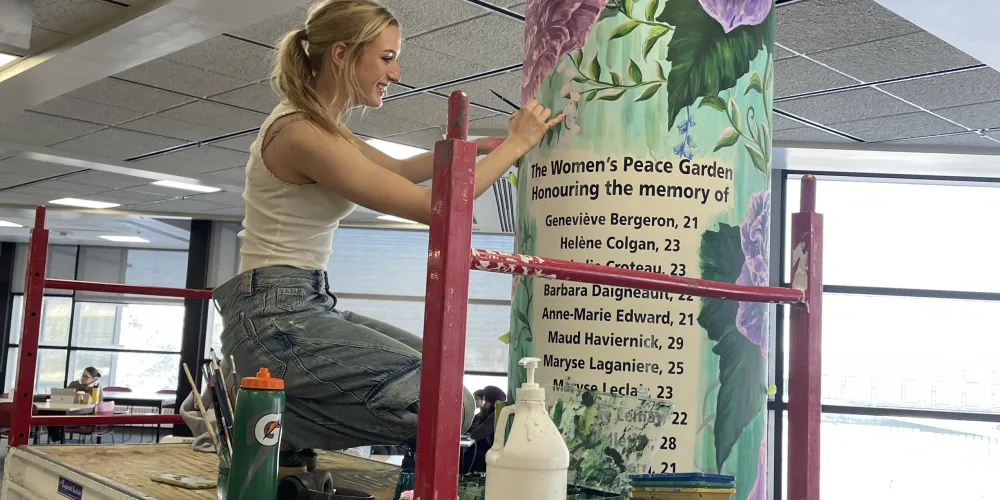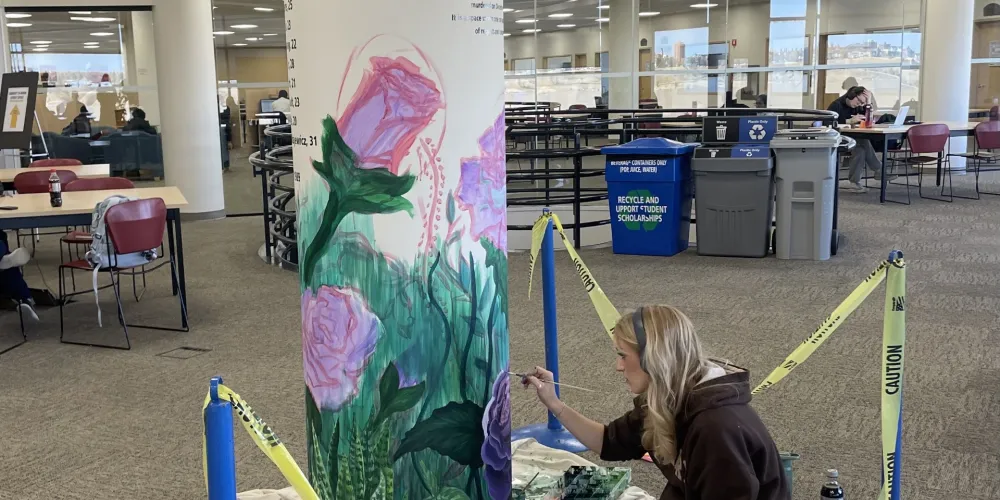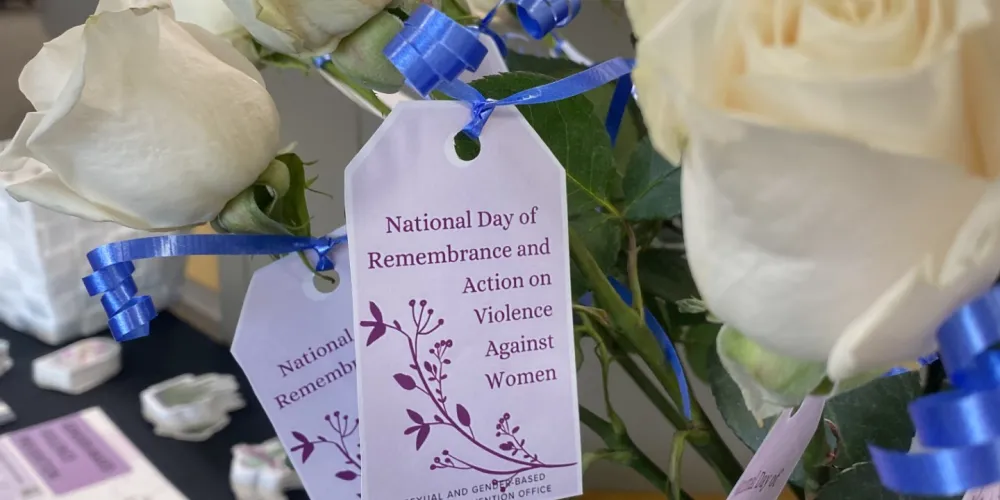National Day of Remembrance and Action on Violence Against Women
National Day of Remembrance and Action on Violence Against Women
A Message from President and Vice-Chancellor, Dr. Digvir Jayas and Vice-Provost, Accessibility, Belonging and Community Martha Mathurin Moe
Over 35 years ago, on Dec. 6, 1989, 14 innocent women lost their lives for simply being in an educational space to pursue their passion and dream at the Polytechnique Montreal in Quebec. This act of violent misogyny shook our country and led Parliament to designate Dec. 6 as Canada’s National Day of Remembrance and Action on Violence Against Women.
Dec. 6 is a day to remember those who experienced gender-based violence (GBV) and those who we have lost to it. We must remember their names: Geneviève Bergeron, Hélène Colgan, Nathalie Croteau, Barbara Daigneault, Anne-Marie Edward, Maud Haviernick, Maryse Laganière, Maryse Leclair, Anne-Marie Lemay, Sonia Pelletier, Michèle Richard, Annie St-Arneault, Annie Turcotte and Barbara Klucznik-Widajewicz.
Gender-based violence is not just a historical moment but a present reality. We need to keep speaking out towards eliminating gender-based and sexual violence on our post-secondary campuses. In Canada and around the world, women, girls and 2SLGBTQI+ individuals still face unacceptable violence and discrimination and this issue has been magnified and amplified by the COVID-19 pandemic.
Every 48 hours in Canada, a woman or girl is killed in an act of gender-based violence. Victims and survivors of GBV often facing lasting personal, social, and economic impacts with consequences that can echo across generations. In Canada, missing and murdered Indigenous women and girls (MMIWG) is a national crisis caused by human and Indigenous rights violations, systemic racism and social and economic marginalization.
The University of Lethbridge will commemorate the National Day of Remembrance and Action on Violence Against Women on Dec. 5. Leah Webster (BHSc '19), Sexual and Gender-Based Violence Coordinator in Student Services, the Accessibility, Belonging and Community Office and the ULethbridge Library will come together to host a workshop and activity in the Women's Peace Memorial Garden (main floor, library).
The entire campus community is invited to attend the workshop Awareness to Action: Gender-Based Violence in the Digital Age. This workshop will explore how technology both amplifies harm and offers new tools for safety, advocacy and solidarity. We invite you to stay after the presentation for a plant pot painting activity to connect with one another.
The global campaign, 16 Days of Activism Against Gender-Based Violence, from Nov. 25 to Dec. 10, is a time to both reflect on violence against women and to take action to end it. This year’s theme is on digital violence. According to the Canadian Women’s Foundation Help End Gender-Based Digital Harm – Canadian Women’s Foundation, 61 per cent of women and gender-diverse people in Canada have faced gendered digital harm compared to 53 per cent of the general population. In today’s connected world, we are seeing growing threats faced by women, girls and gender-diverse people online.
This day is a constant reminder that there is still plenty of work to be done. It takes every one of us having difficult courageous conversations for things to change. Our university is committed to education, advocacy and meaningful action to building a more equitable community where respect and belonging are central. We are better together so let’s create brighter today and tomorrow.
Let Dec. 6 be a day where we remember, reflect and commit to change and action.
Ikkayiinnii (Fast Buffalo) Dr. Digvir Jayas
President and Vice-Chancellor
Aka-isam-o’too (Arrived a Long Time Ago) Martha Mathurin Moe
Vice-Provost, Accessibility, Belonging and Community
Check out these resources for more information
National Day of Remembrance and Action on Violence Against Women
International Day for the Elimination of Violence Against Women November 25
16 Days of Activism Against Gender-based Violence
Final Report on the National Inquiry of Missing and Murdered Indigenous Women and Girls
University of Lethbridge: Peace Memorial Garden
December 6, 2024 marked 35 years since the tragic massacre of 14 women at the Ecole Polytechnique. The University of Lethbridge honors these women with the painting of the Women's Peace Garden Memorial Mural. Creating the Peace Memorial Garden and displaying this tragically beautiful art in the Library demonstrates our commitment to ending gender-based violence on campus and in our community as a whole. The mural was painted by U of L Fine Arts student, Claire Lahey, a SGBVP ambassador. The art creates a narrative honoring these women and educating students to continue to build a safe campus, free from gender-based violence.
The Women's Peace Memorial Garden
Dec. 5, 2025 - Awareness to Action: Gender-Based Violence in the Digital Age
Join the Sexual and Gender-based Violence Prevention Office and the Accessibility, Belonging and Community Office for a time of remembrance and reflection. The event, Awareness to Action: Gender-Based Violence in the Digital Age, which will include a mini-workshop on digital harm and 16 Days of Activism will be hosted in the Library in front of the Women's Peace Garden Memorial Mural at 11:30 a.m. A wellness painting activity will follow the formal program.
Find more information on the event here:
National Day of Remembrance and Action on Violence Against Women 2025
The National Day of Remembrance and Action on Violence Against Women, also informally known as White Ribbon Day, is a day commemorated in Canada each December 6, which is the anniversary of the 1989 École Polytechnique massacre, in which an armed student murdered fourteen women and injured fourteen others in the name of "fighting feminism". The commemoration date was established by the Parliament of Canada in 1991.
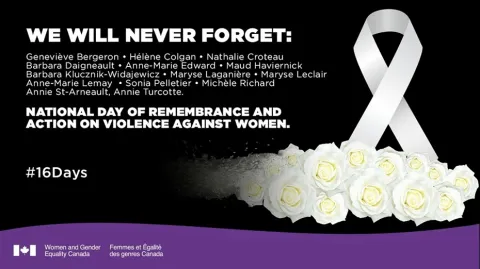
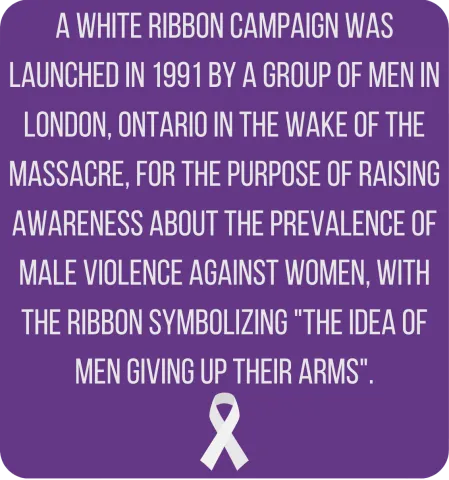
December 6, 1989: Ecole Polytechnique Massacre
Remembering:
Geneviève Bergeron (aged 21), civil engineering student
Hélène Colgan (aged 23), mechanical engineering student
Nathalie Croteau (aged 23), mechanical engineering student
Barbara Daigneault (aged 22), mechanical engineering student
Anne-Marie Edward (aged 21), chemical engineering student
Maud Haviernick (aged 29), materials engineering student
Maryse Laganière (aged 25), budget clerk in the École Polytechnique's finance department
Maryse Leclair (aged 23), materials engineering student
Anne-Marie Lemay (aged 22), mechanical engineering student
Sonia Pelletier (aged 28), mechanical engineering student
Michèle Richard (aged 21), materials engineering student
Annie St-Arneault (aged 23), mechanical engineering student
Annie Turcotte (aged 20), materials engineering student
Barbara Klucznik-Widajewicz (aged 31), nursing student
The École Polytechnique massacre also known as the Montreal massacre, was an antifeminist mass shooting that occurred on December 6, 1989, at the École Polytechnique de Montréal in Montreal, Quebec. Fourteen women were murdered; another ten women and four men were injured.
Sometime after 4 p.m. on December 6, 1989, the gunman, a 25-year-old male, arrived at the École Polytechnique, an engineering school affiliated with the Université de Montréal, armed with a rifle and a knife. He separated the male and female students in the classroom and after separating the students, he ordered the men to leave the room. He then asked the women if they knew why they were there; a student asked who he was and he indicated that he was fighting feminism. One of the students protested that they were women studying engineering, not feminists fighting against men or marching to prove that they were better. He opened fire on the students, from left to right, killing six and wounding three others.
For nearly 20 minutes the shooter moved through corridors on multiple floors of the building, the cafeteria, and another classroom, targeting women. He wounded more students and killed eight more women before fatally shooting himself. In total, he killed 14 women; he wounded 10 other women and four men. The massacre is now widely regarded as an act of misogynist terrorism and representative of wider societal violence against women. The anniversary of the massacre is commemorated annually as the National Day of Remembrance and Action on Violence Against Women.
Over the years, Canadians have responded to the massacre with many memorials demonstrating the commitment to remembering these victims. Ensuring that people will continually become more aware of the incident and encourage individuals to recognize how often violence occurs towards women. Canadian flags on all federal buildings – including the Peace Tower on Parliament Hill in Ottawa – are flown at half-mast on December 6. Canadians are also encouraged to observe a minute of silence on December 6 and to wear a white ribbon (or a purple ribbon) as a commitment to end violence against women.
